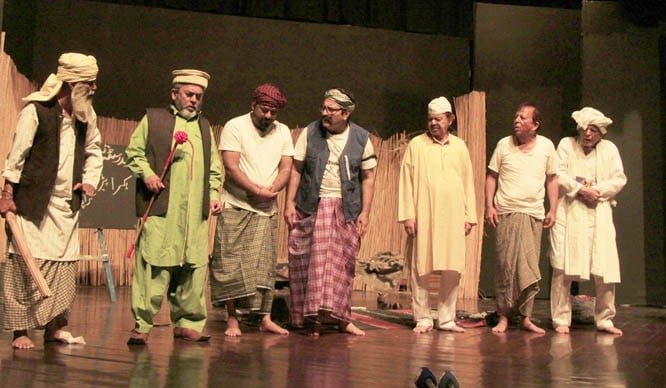
Khawaja Moinuddin’s popular play, Taleem-e-Balighan, was revisited at Lahore’s Alhamra last week

The all-time classic of Pakistani theatre, Taleem-e-Balighan was staged last week at Alhamra in Lahore.
It is usual that plays are staged again and again, and if they happen to be well-known then there is ample justification for that. The restaging of the classics, if the term can be used here, is also important because it galvanises the body of theatrical works and makes a more permanent place in the repository of our cultural heritage. Likewise music - raags and bandishes -- should be heard again and again, and famous paintings viewed repeatedly for similar purposes of creating a permanent art grove in our consciousness.
No wonder plays, as indeed other works of art and culture, should be held every now and then so as to renew our contact with the significant in our cultural tradition. But the play when restaged should have something new and innovative about its production. The script, though, remains the same or is presented with some judicious editing, as the director really holds all the cards to stage the play according to his interpretation of the script. For centuries or even thousands of years, classics have been staged but the innovation has always rested in the way they have been staged. It is assumed that the play and its contents contain something still relevant for the contemporary audiences, while the direction of the same script forges links with contemporaneity.
So it was refreshing to see the direction of the play by Muhammad Qavi, who also did a role in the play. One of the veterans of stage plays as indeed of television, Muhammad Qavi has a very good understanding of the basics of theatre. As it is, so little has changed in Pakistan that the contents of the play written about 65 years ago was still relevant. Qavi though did not only rely on the veracity of the word but created situations in his production that shifted the emphasis from the spoken word to action.
Khawaja Moinuddin’s first play that became very popular was the same Taleem-e-Balighan. Primarily written for the radio it became an instant hit, and the cast of the first production included Rehman Khan, Azmatullah, Sheikh Mehboob and Sheikh Ali. A satire on the policies of the government regarding education, it encompassed an area that was far wider than the mentioned target as it included the attitudes of the people in general and the ruling classes in particular about their approaches to education. That also served as a symbol of the prevailing conditions then.
Being a radio play, it lacked action but the razor-sharp wit and the various situations made up adequately for the absence of movement. This play became so popular that it was staged a number of times by various organisations in various cities of the country. It actually became the signature tune of the author, and has remained so till now.
This most popular play tugged at the heartstrings of people by making them aware of the chasm between their good intentions and actual outcome in society.
Khawaja Moinuddin also made attempts with varying degree of success to create a repertory company and many joined him in the uphill struggle. For years the few who persisted with the shared dream were Qayyum Arif, Nazar Hydarabadi, Sheikh Ali Ahmed, Rafiq Ghaznavi, Muhammed Yousaf, Subhani Ba Yunus and Qazi Wajid.
It was heartening to see Qazi Wajid in action once again on stage in this production. He could well be the oldest or the most experienced of the stage actors still active, and he was there with the entire wherewithal.
The others in the cast were Behroz Sabzwari, Shahzada Raza, Aziz Warsi and Javed Rizvi.
After independence, Khawaja Moinuddin, a refugee like millions of others who had chosen to make their new home in Karachi, initially settled like many others in Pir Illahi Buksh colony. A schoolmaster by profession, his heart though lay in theatre. And some of the themes closer to his heart formed the basis of his artistic experience which subsequently flowered in his plays. Hailing from Hyderabad Deccan, he had seen the loss of his place of birth and the consequent squabbling over its political future by the governments of India and Pakistan. His play Zawal-e-Hyderabad pointed to the decline of the Muslim civilisational dominance after more than 600 years in India. He had written a play earlier on Kashmir, Naya Nishan, based on the annexation of Kashmir by India.
His other plays Lal Qile Se Laloo Khet and Mirza Ghalib Bunder Road Per were also satires. The recurring themes of his plays have been partition and the reconstruction of a new country based on certain values. But, he found the two incongruous, as the pain of leaving the homeland was not assuaged by the reconstruction effort which did not match the high expectations brought about by the independence. He opted for comedy where humour was generated through satire. The present conditions were juxtaposed with the dream of an ideal independent society. The slums of Karachi where teeming humanity lived were contrasted with the magnificence and munificence of the royal palaces.
The contrast was too dramatic and could have easily resulted in hopeless tragedy but Moinuddin still had hope of rescuing it with dosages of humour.
Originality and creativity are rare species. But these days these terms are used with great deal of freedom to almost a level where these have become meaningless. Perhaps, being creative is to reshape and refashion the given forms and to be more critically aware of our heritage, and then wear its armour against the slings and arrows of contemporary cultural assaults. Perhaps, the outcome may be a more measured response.